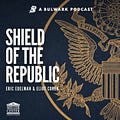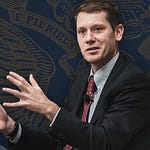Eric and Eliot welcome William Inboden to discuss his new book, The Peacemaker: Ronald Reagan, the Cold War and the World on the Brink. They discuss the existing historical literature on Reagan's Presidency and foreign policy, this new book's contribution to the literature, the complexity of the world that Reagan and his colleagues faced in the 1980's, the role of individuals like Secretaries of State Alexander Haig and George Shultz, as well as National Security Advisor Judge William Clark in advancing the Reagan agenda, and the role of ideas—especially democracy promotion in Reagan's approach to national security as well as his nuclear abolitionism. All three reflect on the nature of the relationship between policy process and policy outcomes.
Shield of the Republic is a Bulwark podcast co-sponsored by the Miller Center of Public Affairs at the University of Virginia. Email us with your feedback at shieldoftherepublic@gmail.com.
Eric’s tribute to George Shultz (https://thedispatch.com/article/secretary-of-the-american-century/)
Collapse: The Fall of the Soviet Union by Vladislav M. Zubok - (https://www.amazon.com/Collapse-Soviet-Vladislav-M-Zubok/dp/0300257309)
Reagan at Reykjavik: Forty-Eight Hours That Ended the Cold War by Ken Adel (https://www.amazon.com/Reagan-Reykjavik-Forty-Eight-Hours-Ended/dp/0062310194)
Learn more about your ad choices. Visit podcastchoices.com/adchoices












Reagan's Peace